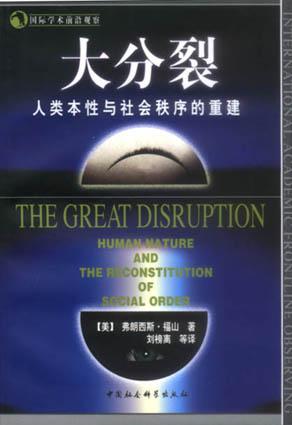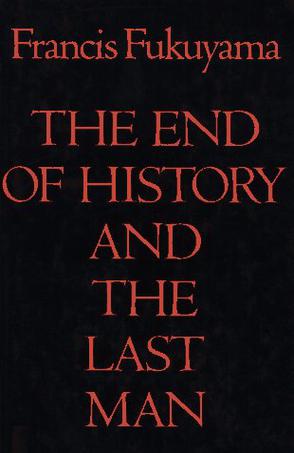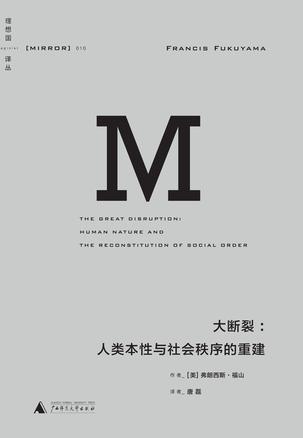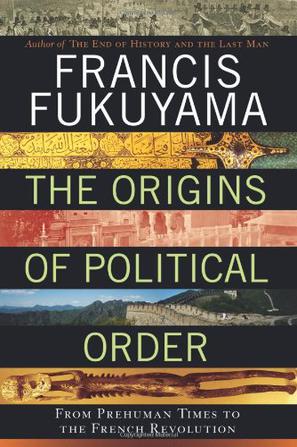-

大分裂
本书是世界著名学者、《历史的终结及最后人》的作者弗朗西斯・福山的最新著作,旨在探讨人类社会物质进步与人类道德发展的关系问题。作者认为,一切宗教、政治、法律等都无法解释人类物质进步与人类道德发展的不同步现象,如人类工业革命的直接后果是物质进步与人类道德的倒退,19世纪泛滥的殖民主义、个人享乐主义、各种暴政等等都是这一现象的具体表现。而20世纪中叶的新科技革命及随之而来的后工业社会和信息时代又给西方带来了犯罪升级、家庭解体、信任危机等各种社会现象。之所以如此,福山认为根本原因是人类的生物学趋向使然,即随着人类生存条件的变化,人类在生理和心理上都有一个大的调运过程。只有根据人类物质进步的现实不断进行社会调适,才能建立较为健全的社会秩序。 -

The End of History and the Last Man
-

Political Order and Political Decay
In The Origins of Political Order, Francis Fukuyama took us from the dawn of mankind to the French and American Revolutions. Here, he picks up the thread again in the second instalment of his definitive account of mankind's emergence as a political animal. This is the story of how state, law and democracy developed after these cataclysmic events, how the modern landscape - with its uneasy tension between dictatorships and liberal democracies - evolved and how in the United States and in other developed democracies, unmistakable signs of decay have emerged. If we want to understand the political systems that dominate and order our lives, we must first address their origins - in our own recent past as well as in the earliest systems of human government. Fukuyama argues that the key to successful government can be reduced to three key elements: a strong state, the rule of law, and institutions of democratic accountability. This magisterial account is required reading for anyone wishing to know more about mankind's greatest achievements. -

大断裂
【编辑推荐】 ★梁文道、刘瑜、熊培云、许知远联袂主编——“理想国译丛”(MIRROR)系列之一(010)——保持开放性的思想和非功利的眼睛,看看世界的丰富性与复杂性。本书有刘瑜专文导读“西方的危机?”。★《大断裂》是一部不但重要,还有野心的作品。它试图在保守派和自由派之间搭建起一座桥梁,从而给陈腐不堪且风格化的争论注入活力并使讨论更为贴近现实。——美国著名政治作家弗吉尼亚?波斯特尔(VirginiaPostrel)★在有自由的地方,社会危机通常总有出路,因为自由允许并鼓励试错与纠错,从而避免了故步自封。在这个意义上,西方人隔三差五的“西方没落论”,与其说是一种幸灾乐祸的“唱衰”,不如说是一种居安思危的警报。福山的《大断裂》也同样如此。——刘瑜(清华大学政治学系) 【内容简介】 《大断裂:人类本性与社会秩序的重建》二十世纪中叶以降,西方主要发达国家相继迈入了所谓的后工业时代,在这一时期,以信息技术为核心的技术进步给经济和社会的传统运行模式和组织方式带来了重大的改变,旧有的社会规范和文化价值也遭到严重的冲击,在西方发达资本主义社会普遍表现为犯罪率、离婚率、未婚生育率的大幅下降和社会信任度的明显降低,福山将此种种与“社会资本”有关的指标的恶化现象总结为“大断裂”。究竟何种原因导致了发达社会大断裂的出现?这是否是资本主义社会转型不可避免的宿命?它们又是如何走出大断裂的?本书对上述问题进行了探索。在福山看来,资本主义社会中,个人主义的不断膨胀尽管造成了传统权威和社会规范不同程度的消解,但基于个体理性和竞争关系自发产生的互惠利他合作仍然是形成各种形式社会联结和社会资本的基石。在新技术条件下,社会组织结构的扁平化促成了社会网络的兴起,使得社会资本对于构建社会秩序的重要性更大,但等级制依然保有不可替代的作用。福山相信,即使面临技术、经济和社会的重大转型,社会秩序始终都会在既有等级制又有自发性的源泉中产生。大断裂不可避免,但社会规范的重建也始终可期。他列举了20世纪90年代以后,发达资本主义社会的大断裂乱象逐渐消退、社会资本重新积累的若干证据,对此结论进行了说明。在本书中,福山一如既往地对资本主义社会及其制度表示了信心。他认为,现时代的后工业资本主义经济会产生对社会资本的持续需求,长远看,它也有能力提供足够数量的社会资本以满足其需求。他甚至对技术发展能够帮助人类生活实现人的整全性表示出乐观。在社会和道德领域表现出的历史周期性,需要也终将通过人类自身重建社会秩序的强大能力来克服。 -

歷史之終結與最後一人
隨著騷盪的 20 世紀即將結束,隨著共產主義的潰解,福山教授要求我們跟著他回到千年來大哲學家一直在問的一個問題:人類歷史有沒有方向?如果有方向的話,它正在朝向什麼終點推移?而我們面對那個「歷史的終結」又要如何來定位自己? 這本書是福山教授繼 1989 年轟動全世界的文章〈歷史的終結?〉之後對同一議題更深入、更引人入勝的鉅著,福山認為有兩個推動人類歷史的巨大力量,一是「現代科學的邏輯」,另一是「求取認可的奮鬥」。這兩大力量導至暴政的滅亡,也促使不同文化的社會走向建立資本主義的民主制度,結果,歷史過程就邁入了終結狀態。由此,人類現在面臨這樣的問題:作為歷史終結的事務狀態,政治和經濟上的自由和平等是否能夠產生一個讓人類完全滿意的穩定社會?或者,由於被剝奪了支配慾的發洩口,這種歷史上「最後的人類」的精神狀況無可避免會將自己和整個世界拉回歷史的混亂和血腥之中?福山對這終極問題的思索極為引人深思。 -

The Origins of Political Order
Virtually all human societies were once organized tribally, yet over time most developed new political institutions which included a central state that could keep the peace and uniform laws that applied to all citizens. Some went on to create governments that were accountable to their citizens. We take these institutions for granted, but they are absent or are unable to perform in many of today’s developing countries—with often disastrous consequences for the rest of the world. In The Origins of Political Order, Francis Fukuyama, author of the bestselling The End of History and the Last Man, provides a sweeping account of how today’s basic political institutions developed. The first of a major two-volume work begins with politics among our primate ancestors and follows the story through the emergence of tribal societies, the growth of the first modern state in China, the beginning of a rule of law in India and the Middle East, and the development of political accountability in Europe up until the eve of the French Revolution. Drawing on a vast body of knowledge—history, evolutionary biology, archaeology, and economics—Fukuyama has produced a brilliant, provocative work that offers fresh insights on the origins of democratic societies and raises essential questions about the nature of politics.